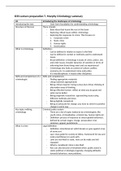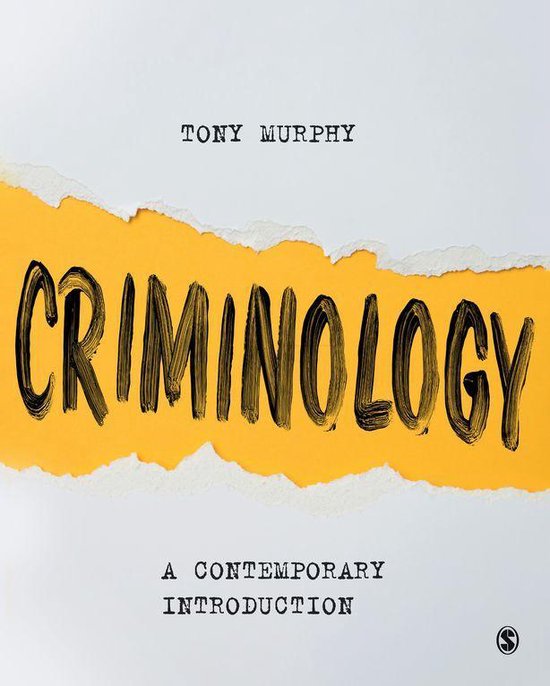ICSS Lecture preparation T. Murphy Criminology summary
H1 Introducing the landscapes of criminology
Introducing the text - Goal: form foundation for understanding criminology
Structure of the text Three strands:
- Basic ideas that found the rest of the book
- Exploring critical issues within criminology
- Exploring the responses to crime. This focuses on:
1. Corporate crime
2. State crime
3. Human rights
4. Social justice
What is criminology Definition:
- Can be defined in relation to topics in the field
- Can be defined in context or methods used to understand
issues
- Broad definition: criminology is study of crime, justice, law
and order issues, broader dynamics of societies in terms of
informing how those things exist and are experienced
- Criminology also looks at context of culture, politics,
economy etc. to understand crime and justice
- It’s interdisciplinary: it needs other disciplines
Skills and competences of a Skills and competences:
criminologist - Finding appropriate materials
- Using materials appropriately
- Being critical enquirer: being curious but critical, thinking of
alternative ways of thinking
- Being reflective learner: reflect at what you do good and
what can be better
- Being pragmatic researcher: approaching issues using
different methods and views
- Being digitally competent
- Being an advocate for change: you have to strive for positive
change in some way
Key topics withing Criminal justice system
criminology - There are a lot of topics looked at by criminologists, like
youth crime, criminalisation, criminal law, human rights etc.
- Definition: process of response to unacceptable behaviour,
defined by certain stages: charge, prosecution, trial,
sentence, appeal, punishment.
What is crime Legal definition
- Definition: intentional act which breaks or goes against a law
of some sort
- Law: clear guide for society to follow, framework for law and
order practitioners to work with.
- Laws are not fixed or static, new can be made and old
repealed
- What is considered crime is also fluid
- Acts can also become criminalised when: public wants it,
states political or ideological agenda, changing attitudes
towards behaviour, new problems.
, Moral and social context of crime
- Issues can become understood because there is a moral
component, which makes something less or more
problematic. This is why things get criminalised or
decriminalised.
- This way in many countries, homosexuality and abortion
became legal.
- In some way what is defined as crime is socially constructed
- Behaviour that deviates from average behaviour can
become formally criminalised.
Beyond legal definition of crime: harms
- If something is not defined as crime, but causes harm in
some way physically or mentally, it demands some kind of
attention and action as well, by examining damaging
processes of victimisation beyond legal understandings of
crime and criminal justice system.
Types of crime - Crime is significant in terms of: who is offender, which act is
it about, who is victim, what should be the response
- Crime can be labelled in several ways: state crimes, war
crimes, sexual offences, property crimes etc.
- Latest forms of crime are hate crime and cybercrime, due to
emerging new technology
H2 ‘theory’, and its uses
What is theory Definition
- An explanation, model or framework for understanding
particular events or processes
Theory in criminology
- In criminology: how to understand nature of offending and
why people engage with crime aetiological theories of
crime
- Aetiological theories of crime are concerned with causes of
crime
- Theories create opportunity for policy-making, law-making,
how to tackle crime and deal with issues in law and order.
H5 Counting crime
Counting crime: what to - How crime is defined derives what’s measured, and how
count? - If behaviours meet criteria of what is defined a crime, they
are counted
- There are certain established mechanisms for counting
crime which are official data
- These follow the legal definition of crimes
- Issue: different criteria used, different categories of crime
created etc.
- Criminologists are interested in the context of for example
who is committing the crime, when and where it took place
and how things changed over time crime-mapping
How do we count crime Two main measures + one less important
1. Official crime data: official statistics/police recorded data
2. Information from victimisation survey work
, 3. Self-report surveys: Representative sample of ppl if they
have been victim of, or committed crime in past 12 months
- With this you can also record victimless crimes
Possible fourth measurement
4. Data from non-governmental organisations and investigative
journalism
- Gives information on what specific types of crimes are
committed
Official recorded data on - Police and court recorded data on crime are pretty easily
crime accessible
- Are useful for looking at trends in crime through time
- Issue: only notifiable offences displayed, free from issues
like sampling and ethics
- Issue: ways of recording crime, classification of offences as
crime, social circumstances have changed significantly
- A rise in reported crime does not mean society has become
more dangerous
Other forms of official statistics
1. Sentencing outcomes
2. Imprisonment
3. Probation
4. Etc.
- Example: past 20 years in UK: rise of imprisonment, falling
crime rates
- Recidivism: proven reoffence in one year follow-up period
after court conviction
Critique of official statistics on crime
- Data is product of processes ending in recorded notifiable
offences, however, in the process, data is lost (data has to
go through recognising, reporting, recording) analogy of
iceberg
- Crimes take place but have to be seen as crime
recognition
- Crimes need to be reported, but are not always bcs ppl don’t
see themselves as victim, or victimless crimes reporting
- For some reasons, reported crimes are not formally
recorded; not enough evidence, distrust reporter, don’t
want to include certain category recording
- Attrition: more and more data is lost over time
Victimisation surveys - Used to better demonstrate nature of the crime problem
- Attempt to produce: generalisable set of finding, based on
representative sample of respondents
- To what extent can data be used: maybe change in police-
recording, new included crimes, new included young victims
- Issue: accuracy of memories, truthfulness of answers
social desirability
Other data sources on Self-report surveys
crime - Strength: opportunity to include cases that would possibly
be lost to recognizing, reporting and recording phases
- Longitudinal approach: survey every other year
- Issue: social desirability






